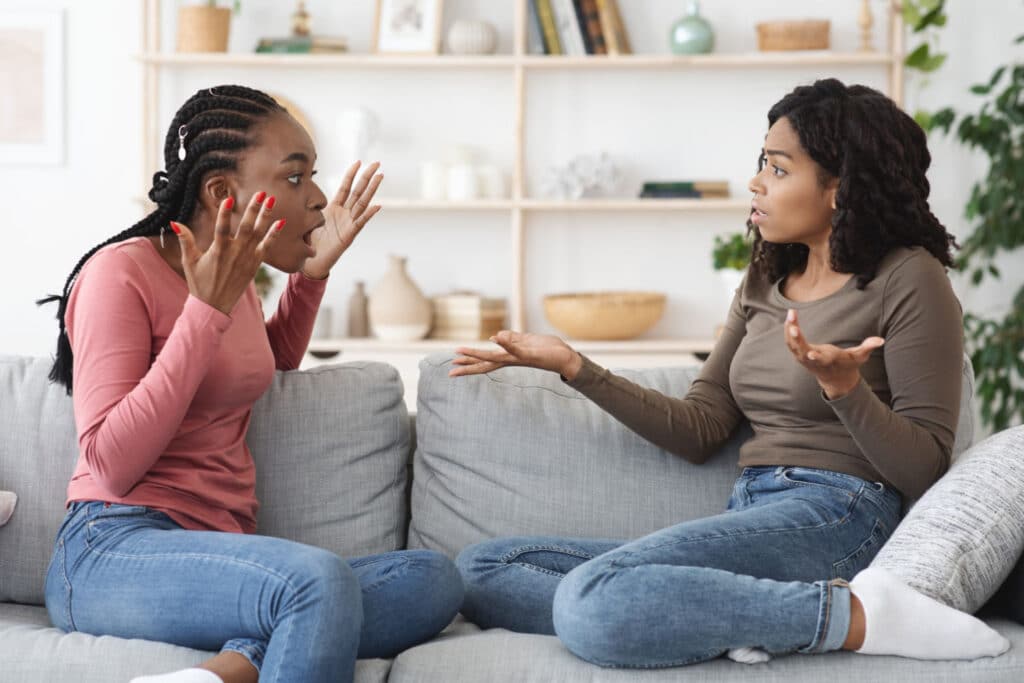5 Types of Narcissism: Decoding Toxic Personality Traits
23rd June 2023
What do we think of the term “break up,” the mind can often think of romantic relationships first.
But friendship breakups can and do happen as we progress through life, and they can also be deeply painful, sometimes more so than romantic disconnections.
Friends can often take on the role of extended family, bonds that last few years and hold huge importance.
And so when they come to an end, there can be a lot of emotional charge that’s left to bring closure to…
So how do you heal and move on?
Understanding the Pain of a Friendship Breakup
Friendship breakups differ from regular romantic breakups in that for them to occur, there must be some extremely deep incompatibility issues, violations of trust and resulting trauma that just can’t be worked through while still in connection.
Unlike romantic relationships, where one is constantly on the lookout for signs that the relationship isn’t aligned, the same isn’t true of platonic relationships. They’re considered to be steady and the foundations of which we can rely on. They’re our support network.
Why Do Friendship Breakups Hurt So Much?
Friendship breakups hurt so much because they are so consistent in our life. It’s a different kind of pain because on some level, especially with those closest to us. One would never imagine breaking up with a friend, as there is often a greater capacity for forgiveness in platonic relationships.
These are the connections more so than any other that shape and mould our identity, leaving lasting imprints on our soul. These bonds are cultivated over years and are intertwined with so many shared memories, both good and bad. Times of offering support to one another, holding each through the dark times and celebrating the miraculous!
This depth of connection and shared history between friends is what makes the ending of these relationships so overwhelmingly painful. It’s not merely a societal expectation to grieve, but a deeply heart-felt sense of loss.
13 Reasons That Result in Friendship Breakup
1. Growing Apart: Friendships form based on shared circumstances, but over time, individual journeys can lead to friends having less in common, resulting in separations.
2. Trust Violations: Trust is foundational in friendships; when it’s broken through betrayal or dishonesty, it’s challenging to rebuild, leading to potential breakups.
3. Life Transitions: Major life events, like marriage or moving, can alter the dynamics of friendships, and not all relationships adapt well to these changes.
4. Jealousy and Competition: Continuous comparisons and achievements can breed resentment in friendships, leading to deterioration if not addressed.
5. Lack of Communication: Regular communication nurtures friendship, and avoiding conversations or misunderstandings can erode the relationship over time.
6. Toxic Behaviour: Recognising and addressing harmful patterns like manipulation or consistent negativity is crucial; otherwise, toxicity can end the friendship.
7. Conflicting Values: Divergence in core personal values can lead to conflicts, and sometimes these differences necessitate parting ways.
8. Unmet Expectations: Unspoken expectations, when consistently unmet, can lead to disappointment and can change a close friendship into a distant one.
9. Financial Disputes: Money disputes or differing financial habits can strain and potentially end friendships if not resolved.
10. One-Sided Effort: Mutual effort is essential in maintaining friendships; if one party feels they’re doing all the work, the friendship can suffer.
11. Influence of Other Friendships: The introduction and influence of new friendships can reduce bonding time with old friends, leading to conflicts or distance.
12. Incompatibility During Crisis: Crises test relationships, and different reactions during tough times can reveal incompatibilities that strain or break friendships.
13. Differences in Boundaries: Continuous crossing or disrespect of personal boundaries can lead to conflicts, making mutual understanding and respect crucial for sustaining friendships.
The Impact and Comparison of Friendship Breakups
The impact of a friendship breakup can be severe. They can influence our subsequent interactions, reshape our self-esteem, and determine our readiness to nurture new relationships. As we’re such social creatures by nature, pre-programmed to thrive in community, understanding the nature of breakups can help ease any future hurt if and when they occur.
Are Friendship Breakups Worse Than Relationship Breakups?
In western society, we tend to prioritise romantic relationships, often overlooking the value and significance that platonic ties have in our life. If one was to gauge the impacts of a breakup, between a romantic relationship and a platonic relationship, would the experience differ greatly? Both are rooted in a deep level of emotional intimacy, shared life experience and vulnerability.
It’s difficult to say whether friendship breakups are worse than romantic relationships, because every relationship has its own unique context. For example, a short term platonic relationship of one year may hurt far less in a breakup scenario then a long-term romantic relationship. How much the break up hurts all rests on the depth and intensity of the connection.
Can A Friendship Breakup Cause Heartbreak?
The short answer is yes! Of course, friendship breakups can cause heartache and heartbreak. Breakups do not have emotional exclusivity within the realms of romantic connections. It is our emotions that dictate the full breadth and depth of our connections.
There is great power and potency within the connections we forge with those in our social circle. These are the people who inspire us and fill us up with their belief energy which then allows us to do things we might not have dared to even dream otherwise.
Navigating the Stages of Grief in a Friendship Breakup
Dealing with the aftermath of a friendship coming to an end can be a turbulent experience fraught with emotional difficulty. It can function not too dissimilar to the five stages of grief that begins with denial, moving to anger, bargaining, depression and eventually acceptance.
What Are The 5 Stages Of Friend Breakup?
1. Denial
When a friendship comes to an end and the initial shock sets in, it can be difficult to accept the relationship is over, as there might still be a lingering hope that things will return to how they used to be, dismissing the fact that the friendship is over and that reconciliation is still possible.
2. Anger
Once it becomes apparent that things aren’t going to change, the pain resurfaces and often triggers anger as a coping mechanism. This anger can be directed towards oneself, the friend involved, or other external factors contributing to the situation – not just people. This can lead to feelings of resentment, perhaps asking questions such as “Why’s this happening to me?” Looking for anything or anyone to assign blame.
3. Bargaining
During this stage, there is an inclination to negotiate in order to find a way out of the pain. Reflecting on times shared and contemplating on what might have been differently if you could turn back time. There might be thoughts such as, “If we had communicated more,” trying to make compromises or deals in hopes of salvaging the relationship.
4. Depression
This stage involves mourning and experiencing sadness due to losing a friendship. As the gravity of the situation becomes a more felt and somatic experience, feelings of isolation may arise along with despair. This can lead to a heightened sense of despondency and disillusionment with other connections in life due to the overwhelming grief.
5. Acceptance
Acceptance isn’t about finding happiness, rather it’s about coming to terms and understanding that the friendship is over and it really is time to move on. It’s having the courage and capacity to finally let go and embrace the lessons learned, directing one’s attention towards growth and forming new connections.
Is It Normal To Have Friendship Breakups?
The way society often portrays friends can create an expectation and an unnecessary pressure to maintain connections past the point of them being healthy.
In reality, relationships, including friendships, are constantly evolving. People change over time, paths diverge and not all relationships are meant to last a lifetime. This is simply an inescapable fact of human interaction. We can’t take everyone with us.
And so, it’s important to acknowledge the ebb and flow of our relationships as natural transitions to new phases of life. Instead of viewing friendship breakups as failures, why not embrace them as part of the ongoing narrative that’s here to foster personal growth and open the door to new connections?
The Duration and Aftermath of a Friendship Breakup
Recovering from the end of a friendship breakup can often be a journey. And like all journeys, there will be twists and turns. However, understanding what could influence this process can empower one to take the necessary steps towards healing and moving on.
How Long Does It Take To Get Over A Friendship Breakup?
The process of healing varies for each person. While some individuals may find immediate resolution and closure on their journey towards recovery, others may find themselves trapped in the cycle of grief for extended periods of time.
It’s important to remember that healing doesn’t follow a linear path. It’s a multifaceted, multidimensional undertaking which can relate to the depth of the bond, the reasons for the breakup, and personal resilience. All of these can be factors in determining how long it might take to recover from a friendship breakup.
And so, in acknowledging that healing from a friendship breakup is not a one size fits all experience, it’s important to bear in mind strategies that may work for others may not necessarily suit your emotional needs. Finding what supports your process of finding closure can be just as much a part of the journey as moving through the stages of grief.
How Long Does A Friendship Breakup Last?
Contrary to what most people believe, breakups are not isolated incidents, and are best likened to phases – as with the five stages of grief. The immediate aftermath of a breakup may be brief, but the after effects and the integration of it may take years to fully come to terms with in order to reach a true state of acceptance.
To truly understand the effects of a breakup requires deep introspection and self-inquiry. This can be made more difficult through the presence of mutual friends, shared spaces or unresolved issues that prolong the healing process. On the other hand, actively working on one’s growth through understanding and accepting the situation can help speed up the recovery.
Because that is the ultimate goal here. It’s not to move on, but it’s to take the experience and filter it through the lens of, “What has this taught me, and how am I now different as a person?” This kind of thinking can serve as a catalyst for even greater insight and personal development.
Can You Be Friends Again After A Friendship Breakup?
There is no real answer to this question. Again, it’s entirely contextual. There will inevitably be uncertainties, concerns and grievances that can make the path to reconciliation difficult if not untenable in some cases.
Restoring a friendship requires groundwork. And that involves rebuilding trust, addressing the issues which led to the breakup and both individuals taking accountability for their part in the dysfunction that played out so there can be a recommitment to one another in order to properly revive the bond.
Engaging in this kind of work is a mark of real integrity; being willing to both be vulnerable and take accountability for past mistakes. Holding onto the past can be so burdensome and weigh down even the best of us. Forgiveness is the key that unlocks the door to reconciliation.
Practical Steps on How to Deal with a Friendship Breakup
Overcoming a friendship breakup requires more than just emotional fortitude; it’s about leaning into practical self-help strategies that not only serve to regulate the emotional but also inspire growth. By empowering oneself with the right tools, it can make the journey of closure much easier to navigate.
How To Get Over A Friendship Breakup
Self-Reflection: Take some time to introspect and understand your feelings about the breakup. Recognise what went wrong and what you’ve learned from the experience.
Seek Support: Call on other friends, family members, or professional therapists to share your feelings and get a different perspective on the situation.
Engage in Self-Care: Prioritise activities that make you feel good, such as reading, exercising, or pursuing a hobby. It’s essential to nurture yourself during this time.
Establish Boundaries: If necessary, take a break from social media or mutual acquaintances to avoid unnecessary confrontations or reminders of the lost friendship.
Focus on Personal Growth: Use this experience as an opportunity to grow emotionally and mentally. This could involve setting new friendship standards, joining groups with shared interests, or developing a deeper connection with yourself.
How To Stop Obsessing Over A Lost Friendship
Resistance: It’s common to grapple with recurring thoughts and memories post-breakup, making it challenging to break free from the cycle of rumination. This can leave one stuck in the patterns of continual denial and bargaining.
Acceptance: Healing then begins with an acceptance of the present situation. It doesn’t mean that what has happened was desirable. What it does mean is that closure can now be found and a new perspective can be brought in by acknowledging the lessons learned.
Transformation: The final step is the metamorphosis into someone entirely new. Instead of being chained to the past, one can look ahead with a renewed sense of self and optimism, opening up once again to the potential of even deeper connections.














